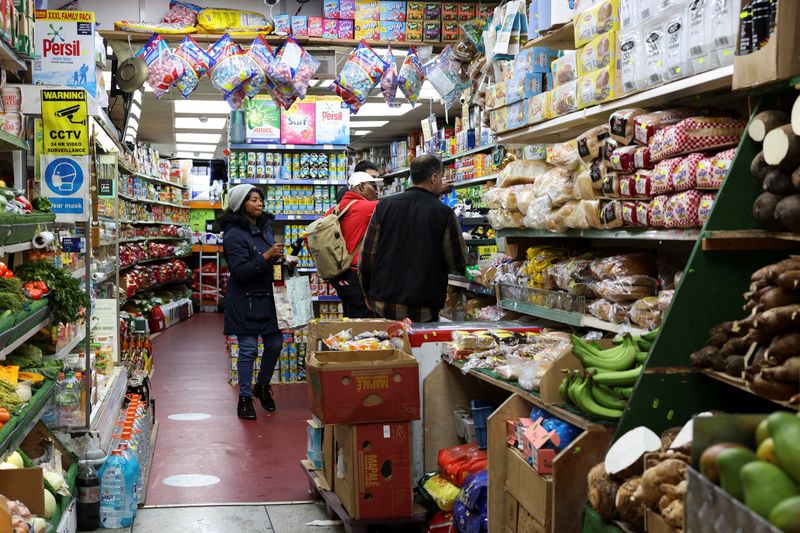By James Davey
LONDON (Reuters) – British grocery inflation eased slightly for the second month in a row in May but remained close to record highs, industry data showed on Tuesday, providing little comfort for consumers grappling with a cost-of-living crisis.
Market researcher Kantar said annual grocery inflation was 17.2% in the four weeks to May 14, and while that was down from 17.3% in its April data set, it was the third fastest rate it has recorded since 2008.
It said UK households now face an additional 833 pounds ($1,051) on their annual shopping bills if they do not change their behaviour to cut costs.
It said prices are rising fastest in products such as eggs and ambient cooking sauces.
The Kantar data for May provides the most up to date snapshot of UK grocery inflation.
Official UK data published last month showed overall consumer price inflation fell to 10.1% in March. However, prices of food and non-alcoholic drinks were 19.1% higher in March than a year earlier, the biggest such rise since August 1977. Official data for April will be published on Wednesday.
The Bank of England said earlier this month it expected overall inflation to fall more slowly than it had hoped, mostly due to unexpectedly big and persistent rises in food prices.
Food retailers have said they expect prices to rise in 2023 overall but with the rate of inflation declining through the year.
Prices for some products that had seen the sharpest rises, such as milk, butter, bread, pasta, vegetable and sunflower oil, have started to fall.
Kantar said the average cost of four pints of milk has come down by 8 pence since last month, but noted prices are still 30 pence higher than this time last year.
It again highlighted that consumers are skirting higher prices by choosing more own-label goods, sales of which grew by 15.2% over the month, almost double that of branded products which rose by 8.3%.
Kantar said overall grocery sales rose 10.8% over the four weeks year-on-year, with sales up 16% during the week of King Charles’ coronation, with an extra 218 million pounds spent.
German owned discounters Aldi and Lidl were again the fastest growing grocers, with sales growth of 24.0% and 23.2% respectively.
UK grocers’ market share and sales growth (%)
Market share Market share % change in
12 wks to 12 wks to sales
May 14 2023 May 15 2022 (yr-on-yr)
Tesco 27.1 27.4 8.9
Sainsbury’s 14.8 14.8 10.5
Asda 13.9 13.8 10.6
Aldi 10.1 9.0 24.0
Morrisons 8.7 9.5 0.6
Lidl 7.7 6.9 23.2
Co-operative 5.7 6.1 2.9
Waitrose 4.6 4.9 4.8
Iceland 2.3 2.3 9.1
Ocado 1.7 1.7 5.6
Source: Kantar
($1 = 0.7923 pounds)
(Reporting by James Davey; Editing by Conor Humphries)
